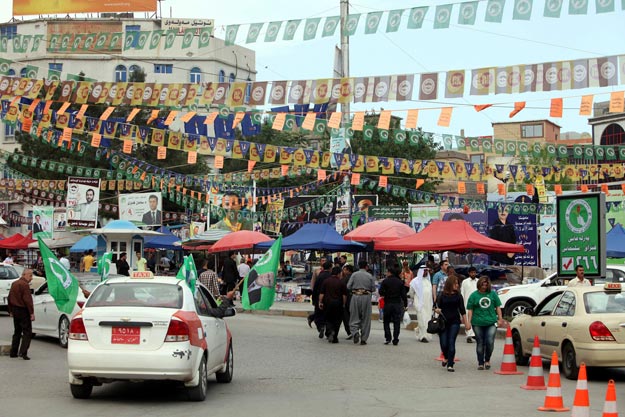Over the last few years, academics and practitioners have been divided over the intentions and interests of the Kurdistan Regional Government (KRG). While one strand of commentators argue that the KRG is aspiring to independence through its oil and gas policies, a second strand argues that most of the actions of the KRG are greed driven. Although both theories make significant points, neither is completely correct in explaining the policies of the KRG. Contrary to both theories, the feasibility of an action is far more important in shaping the interests of the KRG. Economic growth and stability in bashuri Kurdistan is significantly driving the interests of the KRG, although this is not to say that corruption is not a feature of bashuri Kurdish politics and that in the long-run independence is not feasible. However, recent developments have significantly altered the means the KRG has in achieving these ends.
Over the last few months, the political parties in Kurdistani bashur have been increasingly divided in their interests. While, Kurdistan Democratic Party (KDP) won a majority of the votes in the recent KRG parliamentary elections and won 38 seats out of a 111, the Gorran party came second in winning 24 seats, ahead of the Patriotic Union of Kurdistan’s (PUK) 18 seats. Although the elections were held in September 2013, a draft for a new government was not created until recently and now that it has, it has sparked a significant amount of resistance from the PUK. Having traditionally been one of the two big parties in bashuri Kurdistan, the PUK insists that it must maintain its role as the head of the Interior Ministry and thus opposes granting security ministries to the Gorran movement. Its recent refusal to provide a candidate for the secretary of parliament meant that the position went to Fakhradin Qadr, a representative from the Islamic League of Kurdistan (Komal). KDP’s Nechirvan Barzani said that nothing is final and no red lines have been placed on any post for the PUK. Moreover, the PUK’s insistence that Dr. Karim Najmadin remain as the mayor of Kirkuk has sparked tensions to such an extent that it has led to the Kurdish parties deciding that they will run separately in the approaching Iraq Elections.
Secondly, the KRG has been challenged on a number of fronts both internationally and domestically. In December 2013, the KRG announced the completion of the Kurdish-Turkish pipeline and its commitment to using it to export oil starting that month. However, since then the use of the pipeline for the exportation of Kurdish crude has been at best limited and its sale non-existent. The Iraqi Government’s policies have been significant in thwarting the KRG’s use of the pipeline. Amongst these policies is Baghdad’s threat that it would file lawsuits against any third party that buys the crude exported through the Kurdish pipeline. This particular threat has been particularly effective, as most international oil companies (IOCs) prefer to maintain their goodwill when dealing with Iraq as a number of the largest oil and infrastructure projects are in Iraq. Although the threat has been used before against firms like Exxon-Mobil, in this particular occasion its success is based on two differences. Firstly, Exxon-Mobil has greater leverage when dealing with Iraq due to their capabilities in helping Baghdad. Secondly, other IOCs and Turkey do not want to get involved in a situation where they are perceived to be threatening the sovereignty of Iraq. Thus, in this way Iraq has placed significant limits on the international clout of the KRG.
However, Baghdad has also been significantly successful in creating challenges to the KRG’s interests through the creation of domestic pressures. The freeze of the KRG’s portion of the annual Iraqi budget is the most significant example of this. On a number of occasions, the KRG and its key leaders have voiced their voluntary membership to the Iraqi Government. They have argued that they are in a contract with Iraq simply because it suits the national security interests of the Kurdish people and once it stops doing that, they are willing to declare their independence. However, in response to the exportation of around a million barrels of oil to Turkey through the aforementioned pipeline, Iraq’s Prime Minister Nouri al-Maliki cut off the portion of the Iraqi Budget due to the KRG. KRG President Masoud Barzani denounced the cuts and called it “a declaration of war against the people of Kurdistan.” However, in the streets of Sulaymaniyah, the general consensus was that the Iraqi Government was not solely to blame and that the KRG was just as guilty. Employee protests broke out outside water and electricity companies, lecturers and teachers boycotted schools and universities as they did not receive their payments on time. Such boycotts were an indication of their grievances with the KRG for not having reserves for an occasion such as this even though they claim they can declare independence at any point. Essentially the saga indicated that although corruption was no stranger to Kurdish politics and even if to an extent the KRG was aspiring to independence, as it stands, it simply is not feasible.
With around 90% of Iraq’s revenue coming from the sale of natural resources and 17% of the Iraqi budget going to the KRG less costs, the KRG is significantly reliant on the sale of Iraq’s oil. Of even more significance is that 75% of the KRG’s annual portion of the Iraqi Budget goes towards paying the salaries of public servants. If bashuri Kurdistan were to declare independence at this point, they would not have the means to sustain the population, or maintain economic growth and security. Thus as it stands, it is far better for the KRG to return to the basic tenants of diplomacy. Diplomacy being defined not in terms of the KRG’s relative gains in relation to Iraq but rather the maximum amount that the KRG can gain even if it means reaching agreements with the Iraqi government on the use of the crude pipeline.
Thus negotiations with the Iraqi Government on the use of the pipeline seem inevitable. While the KRG had already offered to export 100,000 barrels per day (bpd) through the pipeline in cooperation with the Iraqi National Company for marketing oil, the State Organisation Marketing of Oil (SOMO). These developments have stalled due to attacks on the Kurdish pipelines. Agreements on both the Iraqi Budget and the pipeline have now been stalled till after the Iraqi Elections. Barzani argues that they will start using the pipelines with or without Iraq’s consent. However, it is unclear still whether this was just political rhetoric prior to the elections or the legitimate policy of the KRG.
With the elections gone, Maliki is looking to secure a third term in his role as the prime minister of Iraq. A number of commentators including the American intelligence agencies are assessing that it could mean greater sectarian divides and even a civil war in Iraq. However, through a mixed campaign of diplomacy and securitisation, Maliki has significantly bolstered his chances at re-elections. In a country full of killings and bombings, Maliki reacted to the shooting of a journalist by a Kurdish peshmerga in requesting a “blood for blood” retribution. Some people would identify this as a turn back to feudal times. However, a significant number of Iraqis such as Salah al-Robaei, a university professor in Baghdad attribute the action to the toughness of Maliki and of his “great” leadership.
Although most of us would not agree, if he is re-elected it would be interesting to see if he gains the support of the KRG. Hiwa Zandi, a political analyst believes that the Kurdish parties will be wary of supporting Maliki, due to the significant tensions in the last term between Maliki’s administration and the KRG, it is still unclear how things will unfold. Due to the terrorism in Anbar, the number of votes the Sunni parties get is likely to decline. However, whether Maliki returns to power or another Shia party takes the post, the developments made are likely to be minute. Seeing as the KRG want to maintain the stability and economic growth of bashuri Kurdistan, while also advancing the national security interests of the Kurds in the region, de-escalation of tensions with Iraq in the coming months is most likely and siding with Maliki again is not off the cards.


